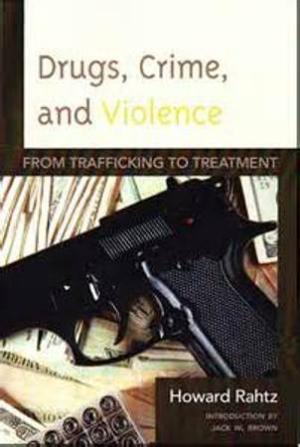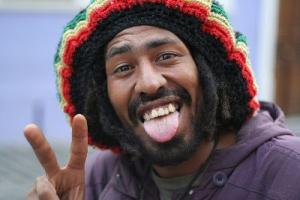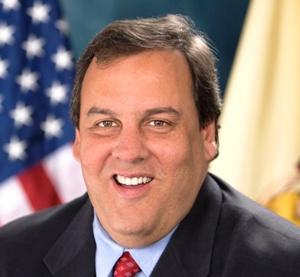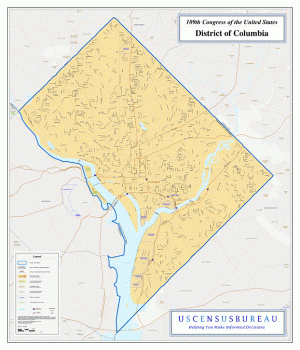While the DC city council is moving on decriminalization, local activists aren't waiting to take the next step: a marijuana legalization initiative.
We review three recent tiles on the drug war's prehistory, its current incarnation, and how we escape it.
In an interview with the The New Yorker's David Remnick, President Obama said marijuana was safer than alcohol and that state-level experiments with legalization were "important," but that he thought it was a bad habit.
US Senate Majority Leader Harry Reid has come around on medical marijuana, and he thinks cops waste too much time arresting pot smokers, too.
Residents of a pair of California counties are fighting back against restrictive ordinances, Arizona rejects some new medical conditions, Illinois rules out draft rules, and more.
The stench grows in Philadelphia, a parole officer gets caught stealing parolee's pills, a reserve cop tries to trade dope for sex, and jail guards continue to go wild.
Florida's medical marijuana initiative appears poised to qualify for the ballot (if it survives a challenge in the state Supreme Court), a new pot poll finds the country evenly split, Afghanistan was on the agenda in the Senate yesterday, and more.
Washington's attorney general has dealt a body blow to the statewide legalization of marijuana commerce there, medical marijuana continues to keep state legislatures busy, a New Mexico town and county pay out big time for a horrid anal search, heroin legislation is moving in Kentucky, and more.
Marijuana law reform bills just keep coming, a most likely unconstitutional food stamp drug test bill gets filed in Georgia, Australian regulators block urine drug testing of state energy company workers, Jamaicans legalizers grow impatient, and more.
The war on weed may be beginning to wheeze toward its end, a researcher reports, and legislators continue to introduce bills to help it on its way. Meanwhile, harm reduction down South gets some attention, a bad bill targets medical marijuana-using parents in Michigan, and Bermuda gets a decrim bill, and more.
Marijuana, marijuana, marijuana. It sure is generating lots of activity, plus Chris Christie speaks out on the drug war, a major farm organization endorses hemp, and Honduras wants to shoot down drug planes.
The District of Columbia city council this week took a preliminary step toward decriminalizing marijuana possession in the nation's capital, with a bill to do just that winning a unanimous committee vote. But the council's belated response to decades of racially biased pot policing may end up just being a blip on the path to outright legalization.
That's because District activists, led by the indefatigable Adam
Eidinger and the
DC Cannabis Campaign have filed a
marijuana legalization initiative with DC officials and are determined to move forward with it.
According to the campaign, the Legalization of Possession of Small Amounts of Marijuana for Personal Use Act of 2014 would "make it lawful for a person 21 years of age or older to possess up to two ounces of marijuana for personal use; to grow no more than three mature cannabis plants within the person's principal residence; and to transfer without payment (but not sell) up to one ounce of marijuana to another person 21 years of age or older; and to use or sell drug paraphernalia for use, growing or processing of marijuana or cannabis that is made legal by the Initiative."
The act does not address legal marijuana commerce because under District law, initiatives cannot deal with matters having to do with District government revenues. In the event the initiative passed, the council would have to come up with any regulatory and taxation scheme.
"Under DC law, voters can't interfere with the city's tax and spending authority," explained Bill Piper, national affairs director for the Drug Policy Alliance (DPA). "And the courts have read that so broadly that they ruled that a ban on public smoking in bars would lead to less smoking, which would interfere with the city's revenue authority."
The time for a legalization push appears to be ripe. Public sentiment in the District, long a bastion of liberal politics, is swinging in favor of legalization, not least because of increased public awareness of the racially disparate impact of marijuana prohibition.In a June report, The War on Marijuana in Black and White, the American Civil Liberties Union found that Washington, DC, had one of the highest racial disparities in marijuana arrests in the country, second only to Iowa. In DC, blacks were 8.05 times more likely to face arrest for pot possession than whites. Numbers such as these are driving the reformist impulse in the District.
A Washington Post poll released Wednesday is a case in point. In that poll, 63% of DC residents favored legalizing small amounts of marijuana, up from only 46% in 2010. And among the District's black residents, support increased even more dramatically, from only 37% in 2010 to 58% now.

Adam Eidinger before the microphone (dcmj.org)
Not only does legalization appear to have public opinion on its side, the District is also easy pickings for initiatives. The number of signatures needed to qualify for the ballot is relatively small, and, in advertising market terms, DC is only a medium-sized market, meaning that the cost of a campaign is also relatively small.
"We only need 25,000 valid signatures, although we're going for 30,000, just to be on the safe side," said Eidinger. "I think we can do that in four months," even though DC law gives them up to six months.
The veteran DC activist estimates that the campaign needs $500,000 to be successful.
"I think we need about $300,000 for signature gathering," he said. "We'll need about half a million to be also be able to fight off any counter-campaign that emerges."
Eidinger and the DC Cannabis Campaign aren't there yet. He said the campaign had received a $100,000 donation from Dr. Bronner's Magic Soaps and an additional $10,000 in bitcoins (!). The drug reform community needs to step up, he said.
"If we don't raise at least $350,000, I don't know if we can move forward," he said. "That's the bare bones. And if we do get this on the ballot, the drug reform community here in Washington should come up with the money. This is the nation's capital," he exclaimed. "It's a twofer. If we can legalize it here, we can legalize it anywhere."
But drug reform organizations that serve as major funding conduits have yet to get on board, at least with their checkbooks.
"We don't have a position so far on the initiative," said Dan Riffle, a spokesman for the Marijuana Policy Project. "We generally support legalization, but it's a question of whether we want to put our resources into a campaign that would improve on a very good law."
Riffle was referring to the District's decriminalization bill, which he described as "the best decriminalization law in the country," with maximum $25 fines and no probable cause for a search based on smell alone.
DPA was similarly focused on the decriminalization bill and perhaps going even further with the council.
"Our first goal is eliminating the mass arrests of people of color in DC, which is why we're working with the council to support the decriminalization bill," said Piper. "And then we will support legalization, either through the initiative process or through the council or both," he said.
"We've had a lot of discussions with Adam," said Piper. "They're in the process of figuring out how much money they can raise to support this, while we're working with Councilmember Grosso and others on a tax and regulate bill."
That's all well and good, said Eidinger, but the initiative campaign needs money now.
"Early donations are the most important," he emphasized. "I think we can get the money to get this on the ballot, but we need money to defend it, and we need to hire good people early. People need to donate now!"
Marijuana reform is happening in the District of Columbia. The question now is how far it goes, and by what route. Decriminalization looks like a done deal, but having a legalization initiative hanging over the city council's head may prod it to take the next step as well.
"The council will for sure decriminalize in the next month," Piper prophesied. "But will they then take up legalization? Having an initiative on the ballot is a good way to force their hand. We're hopeful that the council will realize that they will either end up in a situation where marijuana is legal with no controls, or they can take action and adopt a regulatory approach."
The initiative now awaits approval by the Board of Elections of its language, which could take up to a month. Then, it's on to signature gathering. Then it's winning an election. And then, Congress would have to refrain from blocking it -- or be forced once again to contravene the democratically expressed will of the voters of the nation's capital.
"There are lots of hurdles, but now is the time to move forward with righteous indignation," Eidinger said. "Those people who were talking about decriminalization aren't talking about it now; instead, the goal now is legalization. This is the time for everyone to think big and win!"
back to top
Drugs, Crime, and Violence: From Trafficking to Treatment by Howard Rahtz (2013, Hamilton Press, 141 pp., $28.99 PB)
The Drug Wars in America, 1940-1973 by Kathleen Frydl (2013, Cambridge University Press, 447 pp, $34.99 PB)
The Social Value of Addicts: Uses of the Useless by Merrill Singer and J. Bryan Page( 2014, Left Coast Press, 248 pp., $29.95 PB)
Our century-long experiment with drug prohibition appears to be winding down. Don't get me wrong -- it isn't going to happen overnight, and there exists a huge institutional apparatus that lives off it and won't give it up easily, but we may have seen the worst of it.
The prison population is dropping, and so is the number of drug war prisoners. Federal drug war prisoners are now going to be doing less time thanks to reforms passed during this administration, and maybe even less time, if the US Sentencing Commission has its way. State drug war prison populations are shrinking, albeit too slowly.
Marijuana reform is moving fast, with widespread state-level approval of medical marijuana and decriminalization laws, and now, outright legalization in two states, with more to come in short order.
Some state-level legislators still have the urge to respond to "drug menaces" with ever-tougher criminal justice responses, but those impulses don't usually get the traction they used to, and they are being countered by an increasing acceptance of public health and harm reduction approaches at the statehouse.
And even internationally, where not so long ago, prohibitionist orthodoxy was the consensus position, drug warriors can no longer count on a united front. Uruguay has led the way on marijuana legalization, and the number of countries that have serious issues with the drug war status quo is growing. Perhaps the day when we look back on drug prohibition as a bizarre and embarrassing episode in our national history is coming sooner than we dare to think.
The three books under consideration here address different facets of our drug policy; one tells us how we got here, one explains (at least in part) why we're stuck here, and one offers up suggestions on where we go from here. With apologies to Dickens, it's as if we're seeing the ghosts of drug war past, present, and future.
In The Drug Wars in America, award-winning historian Kathleen Frydl excavates the prehistory of the drug war, focusing on the era between the beginning of World War II and the commencement of the modern drug war under Richard Nixon in the early 1970s. In doing so, she makes the argument that the growth of the anti-drug bureaucracies during and in the immediate aftermath of World War II was driven not so much by the desire to control drug use as by the need of the federal government to reshape itself in an era of rapidly-expanding state power.
That's why we moved from early drug control models of regulating drug consumption and the illicit drug trade (in the post-Harrison Act era) to criminalizing them. While Nixon inaugurated the modern drug war,
Frydl argues, his actions really merely formalized an already created
criminalization that had taken place in the preceding decades.
Frydl isn't about race or culture when it comes to explaining the deep roots of drug prohibition, but about the politics of state power. Her analysis brings a bracing bit of hard-edged political science to the whole question. And of course, while she doesn't emphasize racial or cultural factors, but rather the imperatives of building the Imperial State, she acknowledges the role of race especially in creating an Other against whom it is easy to take action.
And that leads us to the analysis of social scientists Merrill Singer and J. Bryan Page in The Social Value of Drug Addicts. Singer and Page are all about "othering," the process of labeling out-groups as deviant, dangerous, and deserving of repressive actions against them. Drug users have most definitely been "othered" as worthless slackers and disease-bearing burdens on society, although as the authors note in a fascinating historical analysis, this phenomenon of defining drug users as "deviant" is a relatively recent historical innovation, tied as much to the changing role (and class nature) of drug use as to the biopharmacological effects of the drugs themselves.
"Othering" is not a discrete event rooted in a place and time, but an ongoing process, one that helps justify actions taken against the Other, in this case, the horrid persecutions of drug users under the rubric of the drug war. Singer and Page take the reader on a journey through literary, pictorial, cinematic, law enforcement, and policymaking "othering" of drug users, showing at the same time how this socially constructed, drug using Other reinforces the very necessity of repressing and punishing it.

The subtitle of their book, "uses of the useless," refers to the way the very groups that work to define drug users as the Other benefit from the acting of doing so. Constructing scary portraits of drug users sells books, movies, and TV shows. It provides rationales for pumping up police and prison budgets. It even provides fertile research funding opportunities for social scientists, neuroscientists, and the like. And it helps deepen and fortify race and class distinctions that make it easier to do harm to Others, because, after all,
they're not like us.
"I promise you, regular cocaine users do not look like this. They are scrawny and look unhealthy," voluptuous British celebrity chef Nigella Lawson said, explaining how she was not a regular cocaine user. The lovely, upper class Lawson just "othered" her fellow cocaine users.
The Social Value of Drug Addicts is a valuable contribution to the literature of drugs and drug policy, and it adds an analytical perspective sharply different from Frydl's. There is room for both, and then some, when it comes to understanding the complexities of drugs, drug use, drug users, and drug policy.
Howard Rahtz, author of Drugs, Crime, and Violence, has another perspective, one formed by a unique life's work divided between decades in drug treatment and rehabilitation and decades as a drug interdicting Cincinnati police officer. If Frydl traces the ghosts of the drug war's past, Rahtz is about the ghost of the drug war's future, or, more accurately, a future without a drug war.
"Prohibition has filled our jails, criminalized millions of our citizens, provided a financial windfall for international and local criminal groups, and somehow we never tire of pretending that it's working," he writes.
At this point, critiques of drug prohibition are nothing new, but Rahtz teases out three measures of policy soundness -- effectiveness, cost, and basic fairness -- that scream out for a dramatic policy shift away from prohibition. He also provides policy prescriptions for getting off the drug war expressway and onto the exit ramp, beginning with marijuana legalization (which is also embraced by the authors of the other books reviewed here).
Rahtz also calls for the decriminalization of drug possession, but not full-blown legalization. And his full-throated advocacy of drug courts will leave some reformers cold. But Rahtz's conception of the role of drug courts in an era of drug decriminalization is more akin to the alcohol treatment orders judges sometimes give drunk drivers than it is to the way drug courts currently operate.
With drug use itself not being a crime, it would take some other sort of criminal activity to get a drug user in front of a judge in the first place. As a person who is not fond of drug courts and their coercion, regardless of their efficacy, I could swallow post-decrim drug courts for drug-addled misbehavers much more easily than I can their current incarnation.
For the lay reader, Rahtz's work may be the most accessible, but both Frydl and Singer and Page also offer valuable contributions to our understanding of the huge, complex issues around drugs, drug use, and drug policy. Policymakers would do well to consider what ghosts of drug war past, present and future are saying.
back to top
In an interview with The New Yorker released Sunday, President Barack Obama said he didn't think marijuana was more dangerous than alcohol and that the legalization experiments going on in Colorado and Washington were "important." But he also said marijuana use wasn't something he could encourage and he worried that pot legalization could lead to a slippery slope where the decriminalization or legalization of other, more dangerous, drugs might be considered.

President Barack Obama (whitehouse.gov)
The comments came as interviewer David
Remnick prodded Obama on the issue of marijuana policy in the midst of a whopping 15,000-word profile of the president.
Remnick described Obama's position on pot as an area of shifting public opinion where "he seemed even less eager to evolve with any dispatch and get in front of the issue."
"As has been well documented," Obama said in response to a Remnick question, "I smoked pot as a kid, and I view it as a bad habit and a vice, not very different from the cigarettes that I smoked as a young person up through a big chunk of my adult life. I don't think it is more dangerous than alcohol."
But is it less dangerous, Remnick asked?
It is "in terms of its impact on the individual consumer," Obama conceded. "It's not something I encourage, and I've told my daughters I think it's a bad idea, a waste of time, not very healthy."
Perhaps marijuana smoking is a bad habit, but racially biased marijuana law enforcement is bad policy, Obama said.
"Middle-class kids don't get locked up for smoking pot, and poor kids do," he said. "And African-American kids and Latino kids are more likely to be poor and less likely to have the resources and the support to avoid unduly harsh penalties. We should not be locking up kids or individual users for long stretches of jail time when some of the folks who are writing those laws have probably done the same thing."
And thus, the administration's hands-off policy toward marijuana legalization in Colorado and Washington:
"It's important for it to go forward because it's important for society not to have a situation in which a large portion of people have at one time or another broken the law and only a select few get punished."
But then, the professorial president argued the other side of the issue.
"Having said all that, those who argue that legalizing marijuana is a panacea and it solves all these social problems I think are probably overstating the case. There is a lot of hair on that policy. And the experiment that's going to be taking place in Colorado and Washington is going to be, I think, a challenge."
Legalizing marijuana could open the door to talk about legalizing other drugs, he cautioned.
"I also think that, when it comes to harder drugs, the harm done to the user is profound and the social costs are profound. And you do start getting into some difficult line-drawing issues. If marijuana is fully legalized and at some point folks say, 'Well, we can come up with a negotiated dose of cocaine that we can show is not any more harmful than vodka,' are we open to that? If somebody says, 'We've got a finely calibrated dose of meth, it isn't going to kill you or rot your teeth,' are we OK with that?"
back to top
In a Thursday interview with the Las Vegas Sun, Senate Majority Leader Harry Reid said towns in his home state should not be blocking medical marijuana dispensaries, but should instead be embracing medical marijuana. The Nevada Democrat, while not going as far as embracing marijuana legalization, also had some harsh words about prohibition's current implementation in the US.

Harry Reid
"If you'd asked me this question a dozen years ago, it would have been easy to answer -- I would have said no, because (marijuana) leads to other stuff," Reid told the Sun. "But I can't say that anymore. I think we need to take a real close look at this," Reid went on. "I think that there's some medical reasons for marijuana."
Reid, a 74-year-old Mormon and former boxer and football player, is not known as a cutting edge drug reform type, but he said his opinion on marijuana had evolved over the years, and was informed by both hearing about people it had helped and by actually knowing some, including one young man suffering from severe kidney failure.
"He was so skinny and doing so poorly and somebody told him and his mom, you know, you should smoke some marijuana, because one of the side effects is… you get the munchies, you get extremely hungry," Reid said. "He tried it and sure enough, he was able to eat for the first time, he got hungry. So I thought, you know there might be some medical reasons for taking another look at this."
When the Sun asked Reid about whether Nevada should follow the path of Colorado and Washington and just legalize it, Reid demurred, although he did suggest that law enforcement had better things to do.
"I don't know about that. I just think that we need to look at the medical aspects of it. I guarantee you one thing," Reid said. "We waste a lot of time and law enforcement going after these guys that are smoking marijuana."
Reid's comments were music to the ears of the Drug Policy Alliance.
"Majority Leader Reid is right -- marijuana has medical value and too much time and law enforcement recourses are wasted arresting people for marijuana," said DPA national affairs director Bill Piper. "Twenty states have legalized marijuana for medical use and three-quarters of Americans support it. The 40 senators representing those states should follow Reid's lead and support marijuana law reform. It's time to change federal law to allow states to adopt their own marijuana policies without federal interference."
back to top
Residents of a pair of California counties are fighting back against restrictive ordinances, Arizona rejects some new medical conditions, Illinois sets out draft rules, and more. Let's get to it:
ArizonaLast Friday, Arizona officials declined to add several conditions to the list that qualify for medical marijuana. The Department of Public Health denied petitions seeking approval to use medical marijuana for the treatment of post traumatic stress disorder, depression, and migraines. Director Will Humble said the decision was due to a lack of published data regarding the risks and benefits of using medicinal cannabinoids. The department will accept new petitions January 27 – 31.
California
Last Wednesday, foes of Lake County's medical marijuana ordinance turned in signatures for a referendum to repeal it. Organizers turned in 4,222 signatures, about half again as many as needed to qualify for the June ballot, but they must still be verified. The ordinance, which has been suspended pending the outcome of the referendum, bans cultivation in residential neighborhoods in unincorporated parts of the county. Grows would be allowed outdoors on parcels bigger than an acre, with a maximum of 48 plants on a 20-acre parcel.
Last Thursday, Fresno County activists began a signature gathering drive for a referendum seeking to repeal the county's new ban on cultivation. Organizers need to obtain 20,130 valid voter signatures by February 5.
On Tuesday, Assemblyman Tom Ammiano said he would again work this year to get a medical marijuana bill passed in Sacramento. "This year, I will again have legislation to create a regulatory structure for medical marijuana. Nearly two decades after voters legalized cannabis for those who have a medical need, we still see a chaotic environment of prosecutions, threats and confusing court decisions," he said. "We need to have a regulatory structure to make sure that patients have a safe supply, free of criminal influence. We also need this to ensure that growers are environmentally responsible, and to make sure that medical recommendations are based on real needs, not some doctor's profit motive."
Illinois
On Monday, state officials unveiled draft regulations for the medical marijuana program. They include a $150 fee for a patient to register, fingerprinting at the patient's own expense, and barring anyone with a drug felony from being registered. But it could still be a year before some patients are able to register, and that and other aspects of the draft regs are raising eyebrows among patient advocates.
Michigan
On Monday, new state medical marijuana figures came out. They show that the number of registered patients declined about 5%, from 124,000 in 2012 to 118,000 last year. But the number of providers dropped dramatically, from 50,000 to 27,000, because of changes in state law, prosecutions, and adverse court decisions.
New Mexico
On Tuesday, a Santa Fe doctor filed a complaint against the Medical Cannabis Advisory Board, charging that it overstepped its authority by requiring her to provide patient documentation above and beyond that required by state law. The complaint also alleges that board chair Dr. Steven Rosenberg has a conflict of interest because his practice certifies patients for medical marijuana, making other certifying doctors his economic competitors.
Utah
Last Wednesday, a new poll showed narrow majority support for medical marijuana in the Beehive State. The Salt Lake Tribune poll had 51% in favor. The poll comes after parents of children suffering from seizures gained considerable publicity in their bid to get a bill allowing the importation of high-CBD cannabis oil passed.
[For extensive information about the medical marijuana debate, presented in a neutral format, visit MedicalMarijuana.ProCon.org.]
back to top
The stench grows in Philadelphia, a parole officer gets caught stealing parolee's pills, a reserve cop tries to trade dope for sex, and jail guards continue to go wild. Let's get to it:
In Philadelphia,
seven police officers have been pulled from drug investigations amidst an ongoing corruption probe. Police Commissioner Charles Ramsey confirmed Friday that the Philadelphia police Internal Affairs unit is working jointly with the FBI and federal prosecutors in the probe that has already seen one of the officers arrested and led to the dismissal of hundreds of drug charges. Although the officers were transferred out of narcotics in December 2012, it wasn't officially acknowledged until Ramsey's comments. Since then, the city and the department have also been sued 40 times in federal court, with some lawsuits alleging officers framed people with false evidence and testimony and others alleged police stole their property and roughed them up.
In Kalamazoo, Michigan, a Prairieville Township Police reserve officer was arrested last Wednesday on charges he solicited sex in exchange for drugs. Michael Strong, 37, went down after a tipster talked to authorities, and the Michigan State Police and Southwest Enforcement Team set up a sting. Strong was arrested after he met an undercover officer at a local hotel and offered drugs for sex. He is charged with one count of delivery of amphetamine and one count of felony firearms. The drugs reportedly came from "friends," not the evidence room. He's looking at up to seven years in state prison.
In Paris, Kentucky, a Bourbon County Regional Jail guard was arrested last Wednesday for smuggling drugs into the jail after state police raided his home and found narcotics. Officer Jimmy Billups, Jr., 45, came under suspicion during an investigation by the State Police. He is charged with conspiracy to traffic in a controlled substance and possession of a controlled substance. He was last reported on the other side of the bars at the neighboring Scott County Detention Center.
In Greenwich, New York, a state parole officer was arrested last Thursday on charges she took drugs from her parolees for her own use and falsified records to cover it up. Stacey Sullivan, 43, would find the drugs on her parolees, but instead of turning them in for parole violations, would keep and use them herself. She went down after colleagues saw her seizing drugs, but failing to log them in. She faces a felony count of falsifying business records and a misdemeanor charge of official misconduct. She has been released pending prosecution.
In Vidalia, Louisiana, a Concordia Parish jail guard was arrested last Thursday on charges he smuggled synthetic marijuana and cell phones into the jail. David Earl Bell, Jr., 23, went down after surveillance cameras caught "strange activity," and the parish sheriff's office investigated. He confessed when confronted by police. He is charged with introduction of contraband into a penal institute and malfeasance in office.
In Plainfield, Indiana, a Plainfield Correctional Facility jail guard was arrested last Friday after he got caught smuggling marijuana and tobacco into the jail inside a bowl of frozen food. James Thomas was carrying 69 grams of weed and a half-pound of tobacco when he got nailed. He is charged with trafficking and dealing in marijuana. He's been suspended without pay and was last reported residing at the Hendricks County Jail.
In Washington, DC, a former Price Georges County (MD) officer pleaded guilty last Wednesday to providing law enforcement information to a drug trafficking group. Vanessa Edwards-Hamm was one of 17 people indicted in July 2013 in connection with a major DC trafficking ring that purveyed cocaine, heroin, marijuana, and prescription pills. She was indicted on one count each of tampering with documents or proceedings and unlawful notice of electronic surveillance, but copped to a single count of unlawfully disclosing information about a wiretap being used on a target of a law enforcement investigation. She's looking at up to five years in the federal pen.
back to top
Florida's medical marijuana initiative appears poised to qualify for the ballot (if it survives a challenge in the state Supreme Court), a new poll finds the country evenly split on marijuana legalization, Afghanistan was on the agenda in the Senate yesterday, and more. Let's get to it:

harvesting opium poppies in Afghanistan (unodc.org)
ABC News/Washington Post Poll Has Americans Split on Marijuana. A new ABC News/Washington Post poll has support for marijuana legalization nationwide at 49%, with 48% opposed. The poll is in the same ballpark as other polls since the November 2012 elections, where support for legalization has ranged between 45% and 58%. Click on the link to see full poll results.
DEA Operations Chief Bemoans Marijuana Legalization Trend. DEA operations chief James Capra told a Senate committee Wednesday that marijuana legalization at the state level was "reckless and irresponsible" and could lead to dire consequences. "It scares us," Capra said, responding to a question. "Every part of the world where this has been tried, it has failed time and time again." [Editor's Note: No country had legalized marijuana until Uruguay did late last year, and that hasn't gone into effect yet. If Capra is referring to Amsterdam, where sales are tolerated, if not technically legal, cannabis coffee shops are now in their fourth decade of existence, and the problems associated with them are relatively trivial.] "There are more dispensaries in Denver than there are Starbucks," he continued. "The idea somehow people in our country have that this is somehow good for us as a nation is wrong. It's a bad thing. This is a bad experiment. It's going to cost us in terms of social costs."
Missouri Marijuana Legalization Petitions Approved for Circulation. Secretary of State Jason Kander announced Wednesday that 13 marijuana legalization initiatives had been approved for signature-gathering. The bakers' dozen initiatives are all variations on a theme: legalize and regulate marijuana in Missouri. They were submitted by Columbia defense attorney Dan Viets, the chairman of the activist group Show-Me Cannabis. To make the November 2014 ballot, organizers must gather 157,778 valid voter signatures for at least one of them by May 4.
Maryland Coalition to Legalize Marijuana Launched. Maryland legislators Thursday launched an effort to get a marijuana legalization bill, the Marijuana Control Act of 2014, passed this year. They were joined at a press conference by members of the newly formed Marijuana Policy Coalition of Maryland, which includes the ACLU of Maryland, Law Enforcement Against Prohibition, the Maryland League of Women Voters, the Marijuana Policy Project, and the Maryland NAACP.
Medical Marijuana
Florida Initiative Campaign Has Gathered 1.1 Million Signatures. The folks behind the Florida medical marijuana initiative, United For Care/Patients United for Freedom, announced Wednesday night that they had gathered 1.1 million signatures, nearly half a million more than needed to qualify for the ballot. While all the signatures haven't been validated yet, organizers are now confident they will pass that hurdle. Now, they have to wait and see if the state Supreme Court is going to allow the effort to move ahead.
Washington Patients, Advocates Speak Out Against Bill That Would Gut Medical Marijuana System. The House Health Committee got an earful from medical marijuana advocates at a hearing Wednesday on House Bill 2149, which would eliminate cultivation cooperatives (and thus, dispensaries) by 2020 and reduce the amount of marijuana patients could possess and the number of plants they could grow. The bill mirrors many of the recommendations of the state Liquor Control Board, which is charged with implementing I-502 marijuana legalization.
Hemp
Indiana Hemp Bill Introduced. State Sen. Richard Young (D-Milltown) has introduced Senate Bill 357, which would allow the Department of Agriculture to license industrial hemp growing and production. The bill requires the department to get necessary approvals from the federal government, which has yet to approve any such production anywhere in the US.
Illinois Hemp Bill Seeks New Life in 2014. State Rep. Kenneth Dunkin (D-Chicago) introduced a hemp bill, House Bill 2668, last year, but it has languished in committee despite picking up some bipartisan support. He said Wednesday that he was cautiously optimistic that opposition may be softening, and the bill could move this year.
Heroin
Maine Heroin Deaths Up Fourfold from 2011 to 2012. The number of heroin overdose deaths in Maine quadrupled between 2011 and 2012, according to numbers released by state officials Wednesday. Officials said the increase was due to tightening restrictions on the use of prescription opiates, a cheap heroin supply, and, possibly, cuts in MaineCare. But while the increase was dramatic, the 28 heroin overdose deaths reported in 2012 is well below the 2005 peak of 43. In the years between 2005 and 2011, heroin deaths declined steadily.
Heroin Prevention Bill Package Passes Wisconsin Assembly. The State Assembly Wednesday passed the HOPE (Heroin Opiate Prevention and Education) package of four bills designed to reduce the number of overdose deaths in the state. Sponsored by Rep. John Nygren (R-Marinette), one bill would allow anyone to use naloxone to reverse overdoses, another would grant legal immunity to drug users who call for help in an overdose emergency, a third would allow communities to establish prescription drug drop-off points, and the fourth would require people to show ID when picking up prescription drugs. The naloxone and legal immunity bills are Assembly Bill 446 and Assembly Bill 447. The package now moves to the Senate.
Kratom
Oklahoma Wants to Ban Kratom, But Meets Resistance. The Oklahoma Bureau of Narcotics wants to ban the Southeast Asian herb kratom, which it calls "the legal form of heroin," but kratom fans are responding with dismay and disputing the narcs' assessment. Kratom is not a controlled substance under federal law, but narc Mark Woodward said he planned to ban it until it is federally proven to have medical benefits. Kratom users have started a petition to challenge efforts to ban Kratom.
Drug Courts
Study Finds Drug Courts Ignore Science When it Comes to Opiate Substitution Therapies. A small study of drug courts in New York state finds that their skeptical approach to opiate substitution therapies (OST), such as methadone and buprenorphine, can be a barrier to successful treatment. "Many courts do not respect medical consensus on scientifically sound treatment standards. Some courts included OST as part of court-mandated treatment options, while others allowed OST for a court-defined period of time as a bridge to abstinence. Still others showed intolerance and even disdain for anything having to do with methadone and buprenorphine, or -- as with the drug court in Albany County -- refused outright to admit people on methadone or buprenorphine treatment," the authors wrote. "Ordering people who are dependent on opioids to get off their prescribed methadone or buprenorphine medicines can force patients to seek out and become dependent on other opioids like prescription analgesics. Addiction to prescription opioids has been recognized as a priority problem by U.S. policy-makers, but drug courts may be exacerbating it."
Search and Seizure
ACLU Sues Border Patrol Over Interior Border Check Point Searches. The American Civil Liberties Union (ACLU) has filed suit against the Border Patrol, claiming its agent routinely violate the constitutional rights of local residents by stopping and searching them at interior checkpoints on highways near the border. In a 1976 ruling, the US Supreme Court ruled that immigration checkpoints were permissible if the stops were brief, involved "a limited enquiry into residence status," and a visual inspection of the exterior of the vehicle. "But that's not what's happening here," said ACLU attorney James Duff Lyall in Tucson. He said the cases mentioned in the lawsuit provide strong indications that the Border Patrol is using the checkpoints for general crime control, "which the courts have said is not acceptable for a checkpoint. The same thing is happening over and over again to many border residents," Lyall said. "They're going on fishing expeditions where there's no reasonable suspicion."
International
Afghan Drug Situation "Dire," Federal Auditor Tells Senators."The situation in Afghanistan is dire with little prospect for improvement in 2014 or beyond," Special Inspector General for Afghanistan Reconstruction John Sopko told the Senate Caucus on International Narcotics Control Wednesday. Poppy cultivation is at record levels and the drug trade now accounts for 15% of Afghan GDP, Sopko said.
US to Help Afghanistan With Drug Problem, State Department Official Tells Senators. At the same hearing mentioned in the story above, Assistant Secretary of State for the Bureau of International Narcotics and Law Enforcement Affairs ("drugs and thugs") William Brownfield vowed the US would remain committed to helping Afghanistan fight drug production and trafficking even after US and NATO troops pull out at the end of this year. "We will continue to ensure our counternarcotics programs are well integrated with broader US efforts, including assistance programs aimed at supporting a vibrant legal economy," he testified Wednesday. "The expanding cultivation and trafficking of drugs is one of the most significant factors putting the entire US and international donor investment in the reconstruction of Afghanistan at risk," he said.
back to top
Washington's attorney general has dealt a body blow to the statewide legalization of marijuana commerce there, medical marijuana continues to keep state legislatures busy, a New Mexico town and county pay out big time for a horrid anal search, heroin legislation is moving in Kentucky, and more. Let's get to it:
Marijuana PolicyWashington Attorney General Rules Localities Can Ban Marijuana Businesses. In a formal opinion released Thursday, the Washington attorney general's office held that "Initiative 502 as drafted and presented to the voters does not prevent local governments from regulating or banning marijuana businesses in their jurisdictions." The ACLU of Washington said the attorney general's opinion is mistaken and it "will go to court if necessary" to see it overturned, while the state Liquor Control Board, which is charged with implementing I-502 said that the "opinion would be a disappointment to the majority of voters who approved the law."
Marijuana Reforms Will Be on the Legislative Agenda in Louisiana Again This Year. State Rep. Austin Badon (D-New Orleans) has already introduced House Bill 14, which would dramatically lessen the state's draconian marijuana penalties, and further-reaching bills could be forthcoming. The Badon bill passed the House last year before dying in the Senate.
Medical Marijuana
Pennsylvania Medical Marijuana Bill to Get Hearing This Month. State Senate Law and Justice Committee Chairman Chuck McIlhinney (R) said Thursday he had scheduled a public hearing for January 28 on a medical marijuana bill introduced this week. The bill, Senate Bill 1182, is cosponsored by Sens. Daylin Leach (D) and Mike Folmer (R).
Hawaii House Speaker Says State Needs Dispensaries. House Speaker Joe Souki said Wednesday that the lack of places for medical marijuana patients to obtain their medicine was "a gap in the law" that needs to be addressed. That patients can use medical marijuana but have no place to obtain it is "an anomaly," he said. Addressing dispensaries is a "humanitarian" issue, he added.
Utah Poll Finds Narrow Majority for Medical Marijuana. A new Salt Lake Tribune poll has 51% of Utahns supporting medical marijuana, but 67% opposing decriminalization or legalization.
Georgia Poll Finds Narrow Majority for Medical Marijuana. A new InsiderAdvantage poll has 51% of Georgians supporting medical marijuana "in very specific instances, such as in a liquid form to reduce seizures from young children." Some 27% were opposed, and 22% undecided. "The key here is that any legislation must be on a limited basis. That said, Republicans and Democrats both support this legislation by well over 50 percent, while independent voters are close to a majority as well," said Matt Towery, president of InsiderAdvantage and a former legislator.
Heroin
Kentucky Senate Approves Bill to Reduce Overdose Deaths, Increase Trafficking Penalties. The state Senate Thursday approved Senate Bill 5, which would create more treatment beds for heroin users and lengthen prison sentences for heroin and methamphetamine traffickers. A similar version of the bill passed the Republican-led Senate last year, but stalled in the Democratic-led House. The bill would require the state Medicaid program to cover several inpatient and outpatient treatment options for people addicted to opiates, including heroin and prescription painkillers. It also would divert some of the state's hoped-for savings from a 2011 prison sentencing reform package to expand treatment programs. But the bill would also stiffen penalties for people convicted of trafficking in larger quantities of heroin, methamphetamines or both, requiring them to serve at least half of their prison sentences before they are eligible for shock probation or parole.
Search and Seizure
New Mexico Town, County Pay Out Big Time for Forced Anal Searches of Drug Suspect. A Deming, New Mexico, man who was subjected to a hospital anal exam involving three enemas, a colonoscopy, and being forced to defecate in front of police and medical personnel in a fruitless search for drugs will get $1.6 million in damages in a settlement from Deming and Hidalgo County. David Eckert will most likely win additional damages from a local hospital where doctors agreed to perform the exam.
Sentencing
Charles Colson Task Force on Federal Corrections Funded in Federal Spending Bill. The omnibus federal spending bill filed this week and expected to pass quickly includes $1 million to establish the Charles Colson Task Force on Federal Corrections, an independent, bipartisan grouping that will examine a number of challenges facing the federal correctional system, including overcrowding and ways to minimize growth, violence behind bars, rehabilitation, and reentry. Colson was a Nixon administration official jailed in the Watergate scandal who became a prison reformer in the wake of that experience.
International
Spurred by Attorney, Bermuda's Medical Marijuana Debate Heats Up. Attorney Alan Gordon's online petition to have the Bermudan government allow emergency access to medical marijuana for cancer patients has spurred considerable notice on the island, with National Security Minister Michael Dunkley and Gordon publicly clashing over the law and whether Dunkley can act. Click on the link to see Dunkley's comments and Gordon's well-publicized written response.
Vietnam Sentences Three Drug Offenders to Death; Iran Executes Six. And the resort to the death penalty against drug offenders continues. According to the anti-death penalty group Hands Off Cain, three Vietnamese men charged with heroin trafficking got death sentences, while Iran, the world's leading drug offender execution, hung another six.
back to top
Marijuana law reform bills just keep coming, a most likely unconstitutional food stamp drug test bill gets filed in Georgia, Australian regulators block urine drug testing of state energy company workers, Jamaican legalizers grow impatient, and more. Let's get to it:

Jamaican marijuana users want something to smile about (wikimedia.org)
Marijuana Legalization Resolution Introduced in New Mexico Senate. State Sen. Gerald Ortiz y Pino (D-Bernalillo County) Friday pre-filed Senate Joint Resolution 10, which would amend the state constitution to tax and regulate marijuana use by persons 21 and older. If the bill passes the legislature, the amendment would be placed on the November 2014 ballot for voters to decide.
Indiana Marijuana Decriminalization Bill Filed. State Sen. Karen Tallian (D-Portage) last week introduced Senate Bill 314, which would decriminalize the possession of up to two ounces of marijuana. Similar legislation was defeated there last year.
Medical Marijuana
Arizona Health Department Rejects Adding New Medical Marijuana-Eligible Conditions. The Arizona Health Department last Friday decided not to approve adding post-traumatic stress disorder, depression, and migraines to the official list of debilitating conditions that are treatable by medical marijuana. Director Will Humble said the decision was due to a lack of published data regarding the risks and benefits of using medicinal cannabinoids to treat or provide relief for those conditions. The department will accept new petitions January 27 through 31.
Bill to Undo Virginia's Already Toothless Medical Marijuana Law Filed. Virginia has had a law allowing for the medical use of marijuana on the books for years, but it has never actually been used. Now, a Republican legislator, Delegate Robert Marshall of Manassas, has filed a bill to repeal even that. House Bill 684 (click on the link) was set for a hearing today.
Michigan Medical Marijuana Providers Drop by Half. The number of medical marijuana patients registered with the state declined slightly in 2013, but the number of providers declined much more dramatically, by nearly 50%. The number of patients dropped from 124,000 to 118,000, a 5% decline, while the number of providers dropped from 50,000 to 27,000, according to two annual reports required by the state legislature. The decline in providers is attributed to new laws regulating the industry and adverse court rulings and prosecutions. The state did, however, realize a $6.9 million profit in receipts from fees over program costs, up from a $6.3 million profit in 2012.
New York Poll Has Strong Support for Medical Marijuana. A poll released Monday (see questions 36 and 37) showed strong support for medical marijuana in the Empire State. The Sienna Poll found majority support for the legislature taking action on the issue, while a smaller number of respondents favored Gov. Cuomo's limited pilot program. Only about one out of five respondents wanted medical marijuana to remain illegal and unavailable.
Drug Testing
Georgia Suspicionless Food Stamp Drug Testing Filed. A bill that would require all food stamp applicants to undergo mandatory, suspicionless drug testing was filed last Friday. House Bill 772 is the brainchild of Rep. Greg Morris (R-Vidalia). A similar bill passed the state legislature in 2012, but was put on hold after Florida's mandatory suspicionless drug testing was successfully challenged in the federal courts.
Methamphetamine
Indiana Meth Crackdown Bill Gets Hearing Date. A bill that would make pseudoephedrine a Schedule III controlled substance requiring a prescription and would heighten penalties for some methamphetamine possession and trafficking offenses will have a January 27 hearing. The bill, House Bill 1248 (click on the link), is sponsored by Indianapolis Republican Rep. Ben Smaltz.
International
Vietnam Sentences 30 Drug Traffickers to Death. A court in Quang Ninh province has sentenced 30 people to death in a massive heroin smuggling conspiracy case involving over two tons of the drugs. Dozens of others got prison sentences of from two years to life in the largest drug trafficking trial in Vietnamese history. Vietnam sentenced at least 86 people to death in 2012, but it's unclear how many were drug offenders.
Australia's New South Wales Unions Welcome Drug Test Ban. Unions in New South Wales cheered after the state's Fair Work Commission last week upheld a 2012 decision to block a state-owned energy company from doing drug testing based on urine samples. Such testing, which measures off-duty drug use (as opposed to on-the-job impairment), is "unjust and unreasonable," the commission said, ordering the company to use mouth swab drug tests, which would detect only immediate recent use. "While oral testing accurately identifies recent drug use... urine tests unfairly monitor workers' private lives," Neville Betts, from the Electrical Tr ades Union's NSW branch, said in a statement.
Jamaica Marijuana Reformers Want to Step Up Pressure on the Government to Act. The Jamaican Ganja Law Reform Coalition wants a more aggressive campaign to pressure parliament to act on legalizing marijuana. "We need a young MP to break the party ranks and put forward proposals for more meaningful legislation than the half steps that they are taking," coalition chairman Paul Chang told the opening session of the Cannabis Stakeholders Conference organized by the coalition. Parliament is currently dithering with bills that would decriminalize pot possession and expunge arrest record for marijuana offenses, but that's not enough, coalition members said.
back to top
The war on weed may be beginning to wheeze toward its end, a researcher reports, and legislators continue to introduce bills to help it on its way. Meanwhile, harm reduction down South gets some attention, a bad bill targets medical marijuana-using parents in Michigan, and Bermuda gets a decrim bill, and more. Let's get to it:
Marijuana PolicyIntensity of Marijuana Enforcement Declining, Keith Humphreys Says. Academic marijuana policy watcher and addiction specialist Keith Humphreys reports that even though marijuana use is up -- measured by total days of use nationwide -- the intensity of enforcement -- measured by overall arrests divided by total days of use -- is down by as much as 40%. Humphries attributes it to decriminalization and medical marijuana, but also notes that such policy changes often merely formalize what is already occurring on the ground.
Texas Legislature Will Be Faced With Marijuana Reform Bills Again This Year. Two Democratic Texas legislators say they will reintroduce marijuana decriminalization and medical marijuana bills that have gone nowhere in past sessions. Rep. Harold Dutton Jr. (D-Houston) will try for a fourth time to get a bill to decriminalize the possession of under two ounces passed, while Rep. Eliot Naishtat (D-Austin) will try for the seventh time to get his medical marijuana bill to a House floor vote.
Marijuana Legalization Bill Filed in Oklahoma. State Sen. Constance Johnson (D-Oklahoma City) has pre-filed a marijuana legalization bill, Senate Bill 2116. The bill would legalize possession of up to an ounce and allow for the regulation and taxation of marijuana commerce. The legislative session begins February 3. Here's what she's up against: Mark Woodward, with the Oklahoma Bureau of Narcotics, said, "I've seen it wreck more lives than any other drug."
Medical Marijuana
Michigan Bill Targets Patients Who Are Parents. Republican state Sen. Rick Jones (R-Grand Rapids) has introduced a bill designed to make it easier for the state to remove children from the homes of parents who are medical marijuana patients. Senate Bill 736 would allow judges to inspect parents' medical records to see if medical marijuana use is "appropriate" and, if the judge decides it is not, to order the parent to stop using marijuana or designate him or her an unfit parent. Jones said he introduced the bill after hearing complaints from judges. "They want it clarified that they do have the power, as judges, to consider whether or not there's medical marijuana in the home and that there will be access to children and problems," he said.
Meetings on Hawaii Medical Marijuana Law Coming to Hilo, Pahoa. The Drug Policy Action Group and the Medical Cannabis Coalition of Hawaii are holding meetings later this month in Hilo and Pahoa to provide information and get public input on what's right and what's wrong with the state's medical marijuana law, as well as discussing broader marijuana policy reform. Click on the link for details.
Harm Reduction
North Carolina Harm Reduction Coalition OD Prevention Program Gets Noticed. The North Carolina Harm Reduction Coalition (NCHRC) was crucial in getting comprehensive drug overdose prevention laws passed in Raleigh last year, and now they are getting both results and national notice. Click on the title link to read more and see video from CNN and Fox News Charlotte about the laws and the successful use of naloxone to reverse an overdose.
International
Bermuda Marijuana Decriminalization Bill Filed. A senator from the opposition People's National Party (PNP) has filed a marijuana decriminalization bill in Bermuda. The bill would remove all criminal penalties and sanctions for possession of less than 20 grams of marijuana or hashish. At a Tuesday press conference, bill sponsor Sen. Marc Daniels said, "There appears to be a tidal wave of change taking place with our neighbors to our West and South regarding cannabis and cannabis usage. Some US States are making cannabis legal for both medicinal purposes as well as recreational use. The question is whether Bermuda wants to wait until all of our neighbors make changes, or will we be bold enough to chart a new destiny and seek new ways of generating revenue; perhaps with an influx of tourists and/or from local taxes and license fees. The possibilities are endless if we only dare to be different and seize the moment as opposed to playing catch up.'
Obama Marijuana Remarks Spur Finnish Debate. President Obama's weekend remarks on marijuana are spurring debate on marijuana law reform in Finland. "The USA is the number one country in the war on drugs, so if it begins legalizing the use of marijuana, it will surely have a major effect on Europe," sociologist Jussi Perala said. "Making marijuana legal in Finland is utopic, but at some stage something should happen about it. In Finland, harsh punishment can be meted out merely for the intention to use drugs," he said.
back to top
Marijuana, marijuana, marijuana. It sure is generating lots of activity, plus Chris Christie speaks out on the drug war, a major farm organization endorses hemp, and Honduras wants to shoot down drug planes. Let's get to it:

New Jersey Gov. Chris Christie (R) wants to end the "failed war on drugs." (state.nj.us)
Philadelphia City Councilman Will Introduce Decriminalization Bill. City Councilman James Kenney said Tuesday he would introduce a bill that would end mandatory arrests for simple marijuana possession. The bill would allow police to issue a summons requiring a $200 fine and a three-hour drug abuse class instead of arresting violators. Philadelphia DA Seth Williams already doesn't prosecute such cases, instead sending offenders straight to class and giving them the fine. "If the DA is not going to prosecute, there's no reason to arrest," Kenney said.
Wisconsin Legislature Passes Bill to Let Localities Prosecute Marijuana Offenses Even if DAs Don't Want To. A bill, Assembly Bill 164, that would expand municipalities' ability to enforce local marijuana ordinances even if district attorneys decline to prosecute passed the state Assembly Tuesday. It already passed the state Senate last September.
Louisiana Legislators Hear Marijuana Legalization Pitch. Supporters of marijuana legalization told lawmakers Tuesday it could generate tax dollars, provide a cash crop for farmers, shrink jail populations, and bring relief to the sick. The testimony was part of a House Criminal Justice Committee study requested by Rep. Dalton Honore (D-Baton Rouge). No legalization bill has been proposed in Louisiana this year.
Legalization Efforts Coming to Three More Maine Cities. After successfully getting a local legalization initiative passed in Portland, the Marijuana Policy Project said Tuesday it will try to do the same thing in Lewiston, South Portland, and York. The group will attempt to put a marijuana legalization question on ballots in all three municipalities through local citizen petitions. The move is part of a larger effort to legalize marijuana statewide in Maine.
Montana Legalization Advocates Turn Eyes to 2016. Big Sky Country marijuana legalization advocates are halting efforts to put an initiative on the ballot this year, and are instead looking to do so in 2016. An initiative had already been filed and cleared for signature gathering, but "the timing wasn't right," said the Marijuana Policy Project.
Medical Marijuana
Illinois Issues Medical Marijuana Draft Rules, Gets Criticism. The Illinois Department of Public Health Tuesday issued draft rules for the state's medical marijuana program, which set a $150 fee to apply for a patient card, require fingerprinting at the patient's expense for a background check, and bar anyone with a drug felony from getting a card, among other things. Patient advocates criticized the lethargic timeline -- it could take up to a year for some patients to get cards -- the costs imposed on patients, and the background checks. The department is soliciting comment on the draft rules until February 14.
Chicago Ordinance Would Limit Dispensaries to Manufacturing Zones. A proposed ordinance (click on the link) supported by Mayor Rahm Emanuel and Councilmember Edward Burke would restrict the locations of dispensaries in Chicago to manufacturing zones. The Marijuana Policy Project is calling on patients and supporters to attend a Committee on Zoning, Landmarks and Building Standards tomorrow to speak out against the restrictive measure. The meeting starts at 10:00am at city council chambers.
North Carolina Poll Has Solid Majority for Medical Marijuana. A new Public Policy Polling survey sponsored by NORML has support for medical marijuana at 63%, up five points from last year. The poll also found support for legalization growing, but still a minority position. Some 42% of North Carolinians now support legalization, up from 39% last year.
New Mexico Doctor Sues Medical Marijuana Board Over Documentation Requirements, Conflict of Interest. A Santa Fe physician has filed a complaint against the Medical Cannabis Advisory Board, claiming the agency exceeded its authority in requiring patient documentation beyond that required by state law and that the director of the board, Dr. Steven Rosenberg, has a conflict of interest because he reviews patient applications for his own practice.
Hemp
Farm Bureau Calls for Removal of Hemp from Controlled Substances List. At its annual convention in San Antonio last week, the American Farm Bureau Federation passed a policy resolution calling for the repeal of hemp's classification as a controlled substance. The Farm Bureau now joins a majority of leading farming organizations that support hemp farming, including the National Grange, the National Farmers Union, and the National Association of State Departments of Agriculture.
Drug Policy
New Jersey Gov. Christie Calls for End to "Failed" Drug War. In his inaugural address Tuesday marking the beginning of his second term in office, New Jersey's embattled Gov. Chris Christie (R) said the war on drugs needs to end. "We will end the failed war on drugs that believes that incarceration is the cure of every ill caused by drug abuse," he said. "We will make drug treatment available to as many of our nonviolent offenders as we can and we will partner with our citizens to create a society that understands this simple truth: every life has value and no life is disposable."
International
Honduras Passes Law to Shoot Down Drug Planes. Honduran legislators late last week approved a bill that would allow the government to shoot down planes suspected of trafficking drugs. Under the bill, authorities would take progressively more forceful steps to make unidentified aircraft land, although with only the defense minister authorized to order a plane be shot down. The Honduran military shot two small planes in 2012 suspected of carrying drugs, and that led the US to suspend anti-drug radar support for about three months.
back to top














